1889-90 Grievance with the SFA
-
Dismay over players’ departures
-
Disappointment over the circumstances of the Scottish Cup exit
The Scottish Sport carried a notice which they described as a “notice of warning from Partick”. “The Vigilance Committee of the Partick Thistle Football Club would like to meet the acquaintance of a certain government official, who has been poaching the Inchview preserves.” This was clearly an in-joke directed at an agent who had been enticing Thistle players to join other clubs – Bob Marshall and William Hay had signed for Rangers, prompting one member of Partick Thistle to comment that Rangers will soon have the whole Partick Thistle team playing for them. Ironically, Rangers were complaining that English clubs were poaching their players, and warning the English agents away from Ibrox.
Ex-Airdrie player Spence had joined Sunderland instead of moving to Inchview, as had been rumoured. Willie Paul appeared for Cowlairs in the final of the Sir William Cunninghame Cup against Rangers at Ibrox (as a favour to Cowlairs whose regular centre forward was unavailable) and scored two goals in a 4-0 win. Willie also guested for Queen’s Park at the Kincardineshire Games and this began the usual rumours that he would play regularly for Queens for the rest of the season. The Scottish Referee suggested this was unlikely – “he refused to do so before.”
Season 88-89 ended with a 5-2 win over Airdrie, and the new season was brought in with a similar result, a 7-2 win over the whipping boys from Airdrie, in Airdrie. The game was only remarkable for a disallowed goal from a free-kick that had been claimed by Thistle players. It was disallowed because the referee had not placed the ball before Freebairn shot in.
It was announced that the players were to wear new “uniforms” in the coming season – “dark blue shirts instead of jerseys,” bought from William Bell’s shop in Argyle Street. Nearly all the season tickets had been sold prior to the start of the season. After the ill-feeling of the previous season between the two clubs, Third Lanark refused to arrange a match against Thistle. However, fate and the Scottish Cup draw decreed that Thirds would have to play The Jags, in the first round of the Cup.
The first home game of the season saw Jordanvale favourite Andrew Duff return to face Partick Thistle, and help Cowlairs to a 2-1 win at Inchview.
At the quarterly meeting it was decided to print more season tickets.
In the preparations for the Cup tie against Thirds, Thistle faced Renton away, and lost 3-0.
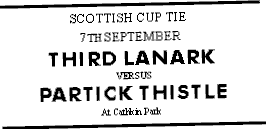 After the ill-tempered Glasgow Cup tie at Cathkin the previous season, this Scottish tie was no different. There was a large attendance of Thistle supporters in the crowd, and with 15 minutes remaining and the score at 3-1 to the home team Thistle captain, William Proudfoot, was hurt. Proudfoot lay down in front of his own goal while Thirds continued playing. It was reported that a fan entered the field and ran towards Proudfoot, prompting a crowd invasion by Thistle fans, and after a few minutes the whole pitch was covered, causing the players to leave the field. Several home players were reported to have been injured while the crowd of Thistle fans made a threatening demonstration outside the pavilion. After 20 minutes the police had cleared the pitch, the game restarted with less foul play than before. The game ended in a 3-2 win for Third Lanark.
After the ill-tempered Glasgow Cup tie at Cathkin the previous season, this Scottish tie was no different. There was a large attendance of Thistle supporters in the crowd, and with 15 minutes remaining and the score at 3-1 to the home team Thistle captain, William Proudfoot, was hurt. Proudfoot lay down in front of his own goal while Thirds continued playing. It was reported that a fan entered the field and ran towards Proudfoot, prompting a crowd invasion by Thistle fans, and after a few minutes the whole pitch was covered, causing the players to leave the field. Several home players were reported to have been injured while the crowd of Thistle fans made a threatening demonstration outside the pavilion. After 20 minutes the police had cleared the pitch, the game restarted with less foul play than before. The game ended in a 3-2 win for Third Lanark.
The Scottish Referee was quick to condemn the scenes:
The 3rd and Partick Thistle have long been keen opponents, and when they come together it is a case of when Greek meets Greek. Both players and followers seem charged with electricity, and at Saturday’s game, however, feeling reached a climax, and things were said and done which have affixed a stigma to Scottish football. I think that the scene of violence and disorder which occurred there deserves the severest condemnation of both press and public, and it is indeed a black day for our most popular pastime when the officers of the law have to render their services to keep players from being brutally ill-treated. Sure am I that none more regret the ebullition of Saturday than the officials and players of both clubs.
We can find no terms of reprobation severe enough. If men cannot control themselves the football field is no place for them, and it is a pity some of the rioters were not seized for condign punishment, in terrorem of any future desire for a repetition of such disgraceful proceedings. It may be said that such things are exceptional. They are not. So long as we follow the present plan of drawing teams in cup matches, the ballot may cause their occurrence at any time, and it must devolve upon those responsible for the safety of the people to see that their safety is duly cared for and ensured.
The interruption at the first glance looked suspiciously like a pre-arranged affair, as the first persons who entered the areas were evidently Partick Thistle supporters. We do not, of course, blame the Partick Thistle Club, as they appeared as much surprised as anyone, but it is asserted that their followers, who mastered in large force, were the ringleaders in the disgraceful movement.
The following week it was reported that four Partick Thistle players, including William Proudfoot, had been unable to attend work on the following Monday, under doctors’ orders. An extensive protest was made by Thistle over the circumstances of the Cup defeat, and the alleged professional activities of Thirds an their players, and decision and counter-protest continued over the next five weeks over the following points.
- The referee’s decision to stop the game because of the encroachment of fans on the pitch affected the outcome of the game.
- The encroachment of fans affected the players’ ability to continue the game after the restart.
- Johnstone and McFarlane of Third Lanark had previously signed for Sunderland Albion and received £1 each so should be regarded as professional players.
- Lapsley of Third Lanark had acted as an agent for Sunderland and had been paid for introducing Johnston and McFarlane.
- Third Lanark played Sunderland Albion and the Thirds share was split between the players rather than given to the club. This effectively made them a professional club.
- Johnston and McFarlane had received payments directly from Third Lanark and were professional players.
Third Lanark denied the claims. The elements of the protest about the match interruptions seem specious given the evidence that Thistle supporters were the cause of the delays. The assertions of professionalism were something that the SFA had struggled to make decisions about in recent months.
At the next SFA meeting the following decisions were made.
- The referee stated that he stopped the game because of the injury to Proudfoot rather than the crowd encroachment (although this seems moot since the game could not have continued regardless). A friend of Proudfoot had entered the field and he was followed by others.
- Since Third Lanark were not informed of this element of the protest at the time it was dismissed.
- Both Johnston and McFarlane had signed for Sunderland Albion and had received money. However, the money had been returned and no games were played. The SFA accepted this explanation without seeing any evidence from Partick Thistle.
- Partick Thistle had no evidence to hand. However, Third Lanark stated that the (Sunderland) match was unofficial and the club committee were unaware of the game. The SFA heard that all money, minus legitimate expenses for players, was retained by John Auld, then of Thirds, now of Sunderland Albion.
The protest was dismissed. Scottish Sport agreed with the SFA ruling but felt that the evidence should have been heard in point 2, if only to clear the Third Lanark players. Partick Thistle were to appeal against the dismissal. In particular they felt that the actions of Lapsley, as a current Third Lanark player, acting against the interests of his own club, and other Scottish clubs, to be despicable.
A fortnight later the appeal was heard and dismissed because nothing new had been brought forward. Partick Thistle pointed out that their original evidence had not yet been heard, and also asked that Thirds old trainer be cross-examined, and that Thirds books should be examined.
A degree of suspicion was being pointed at the SFA, as they continued to refuse to investigate the points, if only to clear the Thirds players and club. The SFA were displeased that a club should re-appeal a dismissed protest. Thistle produced a letter proving that Lapsley received £5 from Aston Villa to induce Bell of Dumbarton to sign for Aston Villa. This evidence, however, was felt not to be relevant to the current dispute. It did, however, show that Lapsley had been involved in this activity before and “showed Lapsley’s character and lack of morals” felt Scottish Sport. Thistle had become unpopular due to the constant appealing to the SFA, and decided to drop to protest.
Back on the field, the Glasgow Cup was preceded by a 3-2 win over Cambuslang at Inchview, before Thistle visited Victoria Park, Govan to beat Summerton Athletic 4-1 in the 1st Round.
A 2-6 defeat away to Albion Rovers and a 5-2 win over Port Glasgow Athletic at Inchview were the preparation for a home 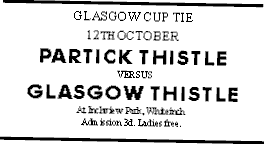 Glasgow Cup tie against Glasgow Thistle. Previously a difficult opponent, the game finished in a 5-2 win for Partick Thistle.
Glasgow Cup tie against Glasgow Thistle. Previously a difficult opponent, the game finished in a 5-2 win for Partick Thistle.
The semi-final draw for the Glasgow Cup drew Thistle with a team they had never beaten – Queen’s Park. Thistle managed a 3-1 win over Glasgow Hibernians and a 0-5 defeat by Cowlairs before scoring three against Queen’s Park and conceding six. Jerry Suter returned to the team after a spell missing. Three goals was, however, more than any other team had managed against Queen’s Park since the start of the season.
Following the Glasgow Cup exit, wins over Battlefield away and Albion Rovers at home, and a 4-4 draw with Morton in poor light in Greenock were followed by disappointing defeats – 2-5 at Ibrox at the hands of Rangers, and 1-2 at home to Linthouse.
Sam Clark joined the numbers at Inchview from Clyde and scored in his first 1st XI game, a 4-0 win over Battlefield at home. Clark was to replace Matthew Ferguson, who was leaving Scotland to move to Japan. The following week Clark played at centre against Dumbarton, replacing Willie Paul, who was turning out for Clydesdale Harriers against Rangers. Clark helped the team to a creditable 2-2 draw in Dumbarton.
A poor 1-3 defeat at the hands of Royal Albert at Inchview followed Christmas, before the following squad was announced to travel to the north-east of Scotland for a New Year tour: McCorkindale, Proudfoot, Robertson, Killin, Freebairn, Gorham, Johnston, Drummond, Paul, Hislop, Clark, McLean, Smith and McLeod. The squad would be accompanied by trainer J.Kelly.
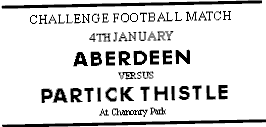 Football in the north-east was still somewhat in its infancy, and Partick Thistle were considered a big draw. Four games were played and four wins recorded – Dundee Harp (10-1), Victoria United (2-0), Montrose (4-1), and Aberdeen (5-2 at Chanonry Park). The two goal defeat that Victoria United suffered was regarded as the best result that an Aberdeenshire team had ever recorded. Following the game at Chanonry
Football in the north-east was still somewhat in its infancy, and Partick Thistle were considered a big draw. Four games were played and four wins recorded – Dundee Harp (10-1), Victoria United (2-0), Montrose (4-1), and Aberdeen (5-2 at Chanonry Park). The two goal defeat that Victoria United suffered was regarded as the best result that an Aberdeenshire team had ever recorded. Following the game at Chanonry
The players returned refreshed from the tour and were presented with a cap to remember the tour, embroidered with “N.T.1890” on the front. The tour had done the players some good – wins were quickly recorded over Kilbirnie (5-2 at home, with Willie Paul scoring), and over Port Glasgow away (9-2).
The burgh of Partick was shocked at the death of sitting Liberal Unionist Member of Parliament Alexander Craig-Sellar. Sellar, who had been a keen supporter and patron of Partick Thistle, had been ill for some time. In the days of debate over home rule for Ireland it was expected that the Unionists would lose the seat, but James Parker Smith retained it a few weeks later.
Rangers raised concerns at the monthly SFA meeting that English clubs were poaching players from Scotland and requested that the English FA should stop it’s clubs from signing Scottish players. This would have raised a wry smile from Inchview as Thistle had been frustrated by the Ibrox club’s signing of Marshall and Hay during the close season. The Scottish Referee was moved to comment “This is pretty impudent, coming as it does from a club which has preyed and poached on its neighbours without the slightest thought about how they might like it”.
Rangers had not won in Partick for a long spell, so when they visited Inchview and left 2-0 winners, it was a bitter disappointment, despite the fact that Willie Paul was missing, playing for Glasgow against London. John McCorkindale tried to fool the referee and Rangers players after the first goal by quickly taking a goal kick and playing on, but the ref eventually realised, stopped the game and ensured the game was restarted from the centre.
Between the Rangers and the Partick Thistle there has long existed a strong feeling of intense rivalry, intensified this season by inclusion of two of last year’s Thistle team in the Light Blues ranks. Up till Saturday the Ibrox Park team had never succeeded in beating the Knights of the Thistle on their own ground. They man aged to get the better of them though, much to their supporters’ joy. A good sized crowd— well favoured with Blues and Thistleites — greeted the teams on appearing. Neither side was strongly represented, and the play consequently was not particularly brilliant.
The Thistle ground is not a billiard table, and when there is anything of a strong wind blowing science is pretty much at a discount. This was just about the state of matters on Saturday. It was a hard enough a game, with here and there a glimpse of combination and an occasional knock. The Jags played up uncommonly well in the first half with the wind behind. A little judgement in their shooting would have gained them a point or two. They were too excited, however, to take advantage of their chances.
Allan and Gow in front — Donald scored both goals —Marshall, at half, and Hendry and Reid in the rear, showed out brightest on the Rangers side. Johnstone and Hislop, in front, Killen, at half, and Proudfoot and McCorkindale, at back and goal, were the bright particular stars of the Thistle. Hislop did plenty of work, and for a time he did it well, but was not well supported in front of goal. Little Johnstone had a particular liking for Hay, and the tall ‘un had all his work cut out for him in looking after his old mate. Donald Gow found Killen a stiff ‘un to get round. The youngster tackles very well, and is not easily flurried. Proudfoot was in brilliant tackling and kicking form. The game ended in a win for the Light Blues by 2 goals to 0 – about a correct idea of the run of the play.
[Scottish Referee, 27 January 1890]
If this was a disappointment then the following week’s game, at home to young Dumbartonshire outfit Methlan Park was even more so. The visitors left with a 7-2 win. The game had been a physical one, and Thistle cancelled the following week’s game due to the number of injuries the players were carrying, and the following week again, four players were still missing when Thistle visited Westmarch to play St Mirren. 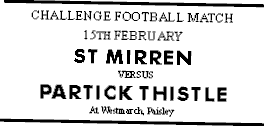 Thistle were also missing McCorkindale, who had accepted an invitation from Rangers to play with them against Everton. An unusual exchange arrangement saw David Reid of Rangers played in goals for Thistle. The under-strength team won 4-1.
Thistle were also missing McCorkindale, who had accepted an invitation from Rangers to play with them against Everton. An unusual exchange arrangement saw David Reid of Rangers played in goals for Thistle. The under-strength team won 4-1.
The poor result against Rangers appeared to have given the players a shove, and in the following weeks Clyde (8-1 at home), Ayr (5-3 at home, missing Willie Paul who was at the Scotland international trial match at Third Lanark), St Bernards (5-3 at home), Linthouse (3-1 at Langlands, gaining revenge for an earlier defeat), and Morton (5-0 at home) were recorded in March.
Representative honours also came Inchview’s way, when Willie Paul further impressed (although he was often disregarded for international recognition by members of the press who felt he was too much of an individual and not enough of a team player). Selected for the match against Wales (although many people thought he had played well enough in the last two years against the Welsh to deserve a step-up to play England) he scored four of Scotland’s goals in a 5-0 win.
Ason Villa were among the clubs impressed with Paul’s performance and ability, and offered him terms for next season. The financially-lucrative offer was rejected (“treated with scorn” reported the Scottish Referee).
John McCorkindale was selected for the Glasgow team to play against the East of Scotland FA, which Glasgow won 3-2.
Prior to a trip down south, Thistle visited Whitefield Park, losing 2-5 to Cambuslang.
The trip to play Derby was disappointing, losing 1-5 at the Racecourse Ground. A 0-1 defeat at Stoke City was also recorded.
A 5-2 win over St Mirren at Inchview was followed by an excellent 4-0 victory over Renton (goals from McLeod, Paul(2) and Johnston) which the Scottish Referee reported on:
Seldom has Hislop played such a brilliant right-wing game. His centres were really beautifully played, and McLeod on the left wing had every chance to head into goal. The science played by Graham and Proudfoot was of a very high order indeed. The former’s placing of the ball will compare favourably with any player in the city. Although Paul has lost some of the impetuous rushes which gained him his reputation he still maintains his prestige of plying the wing men with the ball. There used only to be one in the rank of the Thistle team who wore a cap while playing, but now Sam Clark shares the fashion with Johnston. When it comes to heading the ball into goal a cap is rather a hindrance to accurate aiming.
The club follower with the blood curdling war cry who inhabits the grandstand again was heard when the Thistle clapped on their several goals. Some frightened listeners say the expression is a Volapük one but what will our shouts be like if we adopt that language? We tremble at the mere thought.
The idea of nursery for future football players can be witnessed at half time on Inchview when the field is covered with the juvenile followers of the Partick Thistle.
The Renton game preceded another jaunt south to play Everton (who had triumphed 6-2 at Ibrox the previous week). In front of 9000 fans the home team outclassed Thistle 6-2 for which Thistle were rewarded with a £35 appearance fee. John Hendry of Rangers guested for Thistle. The team shown in the programme below differs from the one given in the newspapers after the game. (Everton programme images courtesy http://www.evertoncollection.org.uk/
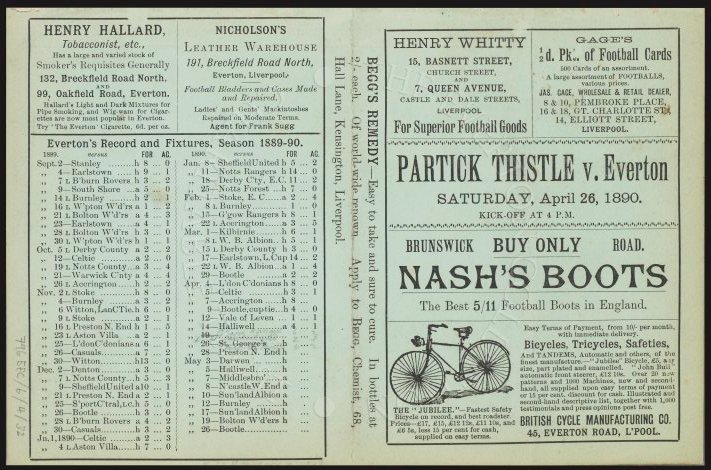
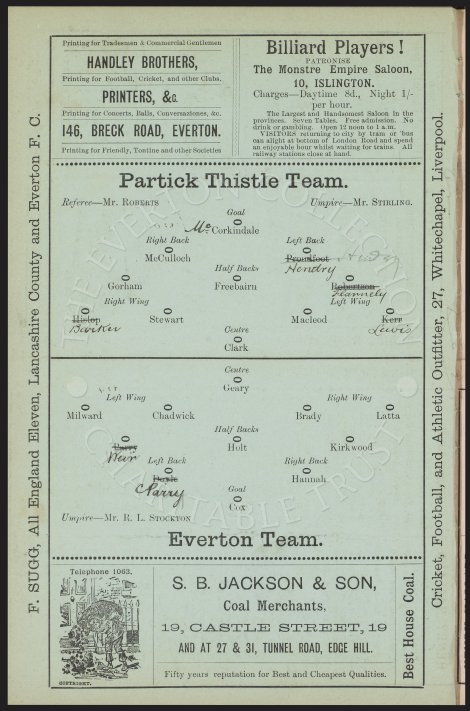
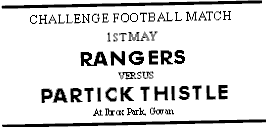
The disappointment felt when Rangers had come to Partick and won was overturned when a visit to Ibrox provided a 6-3 win over Rangers, while Airdrie were beaten 4-2 the following week at Inchview.
The season began to wind down with a range of benefit matches and local tournaments. Northern knocked Thistle out of the Maryhill Charity Cup 3-1 at Hydepark, while a 4-4 draw was recorded at Somerset Park against Ayr. Benefits were played against Glasgow Thistle (1-2 defeat, for the Masonic Lodge Scotia (178), and against Abercorn for the Partick Orphanage (a 2-0 win).
At the Annual General Meeting it was announced that 46 matches had been played, with 26 won, 16 lost, and 4 drawn. J.N. Boag retired as President, and was unanimously replaced by David Hastie. The following committee was elected:
- Patrons – Sir Andrew McLean, J.Parker Smith MP
- Hon. President – J.H. Robinson
- President – David Hastie
- Vice President – Walter McLean jnr
- Hon. Secretary – Wm. Stirling
- Match Secretary – Andrew M Smith
- Treasurer – Charles McQuarrie
- 1st XI Captain – William Proudfoot
- 2nd XI Captain – L. Proudfoot
- Committee – J.N.Boag, A.Rose, A.Auchterlonie, J.Goudie, J.Dougall, M.Bryson
- Glasgow FA rep – J.N.Boag (replacing McQuarrie)
- 2nd XI FA rep – A.M.Smith
The English League had begun in 1888, the natural progression from the professionalism that had been accepted in England since 1885, and since then players had been regularly lured south on the promise of money. It was felt by the top clubs in Scotland that a similar league set-up would be required to stem the flow of talent.
Rumours had been circulating in Scottish football about a league set-up, and in February 1890 Partick Thistle had expressed an interest in taking part in a Scottish league. In March 1890 Renton FC became the catalyst which would bring the Scottish League into being. Fourteen clubs were invited to attend a meeting to discuss a league set-up. Partick Thistle were not one of them. This was of great disappointment, because Partick Thistle felt that their results against the invited clubs over the last year merited inclusion.
The clubs invited (with Partick Thistle’s results against in brackets) were Abercorn (2-0), Cambuslang (3-2, 2-5), Celtic, Clyde (8-1), Cowlairs (1-2), Dumbarton (2-2), Heart of Midlothian, Queen’s Park (3-6), Rangers (2-5, 0-2, 6-3), Renton (0-3, 4-0), St Bernards (5-3), St Mirren(4-1, 5-2), Third Lanark (2-3) and Vale of Leven.
The League was inaugurated in April 1890, without Clyde and Queen’s Park, who declined to attend, and St Bernards, who were not elected. Games against the attractive league teams would now be few and far between. Time would tell whether this would have a detrimental effect on the clubs left without the league.
Categories
- Miscellaneous (16)
- Other clubs (15)
- Players (26)
- Thistle – early years (48)
- Thistle – general (5)
Football history links
- Ayr United archive
- Bill Shankly
- Falkirk Historian
- Gallant Pioneers – Early history of Rangers
- Glasgow Herald archive at Google
- Hibernian
- Hibernian Historical Trust
- London Hearts
- Partick Thistle history archive by StuTheJag
- Rangers History
- Scottish Football Historical Archive
- Scottish Football Museum
- Scottish Sports History
- ScottishLeague.net and forum
